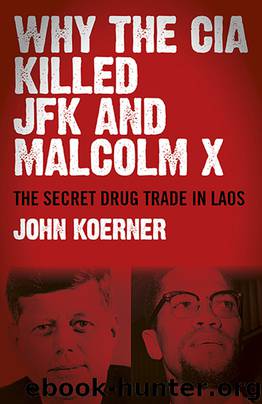Why The CIA Killed JFK and Malcolm X by John Koerner

Author:John Koerner [Koerner, John]
Language: eng
Format: epub
ISBN: 978-1-78279-700-5
Publisher: Chronos Books
Published: 2014-11-27T16:00:00+00:00
Johnson and Nixon Cast Their Lots
Much to the delight of the CIA and the military, President Lyndon Johnson and President Richard Nixon both saw to significant expansions of the Vietnam War, which ensured that by extension a greater commitment would be made to Laos as well, all in the name of fighting the Cold War communist threat. Just four days after JFK’s assassination, the newly sworn in president approved National Security Action Memorandum 273.
“It remains the central objection of the United States Government in South Vietnam to assist the people and government of that country to win their contest against the externally directed and supported communist conspiracy,” the document read. This essentially reversed Kennedy’s withdrawal policy, documented in chapter two. “The test of all U.S. decisions and actions in this area should be the effectiveness of their contribution to this purpose.” President Johnson also said that he expected “full unity of support” throughout the entire government for this new policy, perhaps expecting some resistance from Secretary of Defense Robert McNamara, or other JFK appointees. LBJ also approved the planning for any necessary “increased activity” for the CIA, the Department of State, and the Department of Defense in point number seven. Importantly, point eight on the memorandum approved for more covert operations into Laos to address the “fluctuating situation.”198
It would only be when Johnson was in the last days of his administration, when he was a lame duck president with nothing to fear, that he made an attempt to end the war. However, the 1968 peace conferences were sabotaged by the next president of the United States, the GOP Nominee, Richard Nixon. Journalist Robert Parry of Consortium News wrote an article about this on May 8, 2013.
In late October 1968, Beverly Deepe, a 33-year-old Saigon correspondent for the Christian Science Monitor, came upon a story that could have changed history. A six-year veteran covering the Vietnam War, she learned from South Vietnamese sources that Richard Nixon’s campaign was collaborating behind the scenes with the Saigon government to derail President Lyndon Johnson’s peace talks.
On Oct. 28, Deepe sent her startling information to her Monitor editors in the United States, asking them to have the Washington bureau “check out a report that [South Vietnamese Ambassador to the United States] Bui Diem had sent a cable to the Foreign Ministry about contact with the Nixon camp,” she told me in a recent e-mail exchange.
At that moment in 1968, the stakes surrounding Nixon’s secret contacts could hardly be higher. With half a million U.S. soldiers serving in the war zone – and with more than 30,000 already dead – a peace deal could have saved countless lives, both American and Vietnamese. Progress toward a settlement also could have meant defeat for Nixon on Election Day, Nov. 5.
Download
This site does not store any files on its server. We only index and link to content provided by other sites. Please contact the content providers to delete copyright contents if any and email us, we'll remove relevant links or contents immediately.
| Espionage | Hoaxes & Deceptions |
| Murder & Mayhem | Organized Crime |
| Serial Killers | White Collar Crime |
Mindhunter: Inside the FBI's Elite Serial Crime Unit by John E. Douglas & Mark Olshaker(7834)
Wiseguy by Nicholas Pileggi(4586)
Hitman by Howie Carr(4376)
Room 212 by Kate Stewart(4107)
Secrecy World by Jake Bernstein(3782)
Breaking Free by Rachel Jeffs(3621)
Killers of the Flower Moon: The Osage Murders and the Birth of the FBI by David Grann(3609)
Papillon (English) by Henri Charrière(3269)
Killers of the Flower Moon by David Grann(3238)
Say Nothing by Patrick Radden Keefe(3060)
The Secret Barrister by The Secret Barrister(3008)
American Kingpin by Nick Bilton(2970)
Molly's Game: From Hollywood's Elite to Wall Street's Billionaire Boys Club, My High-Stakes Adventure in the World of Underground Poker by Molly Bloom(2966)
Mysteries by Colin Wilson(2885)
In Cold Blood by Truman Capote(2685)
I'll Be Gone in the Dark by Michelle McNamara(2561)
Signature in the Cell: DNA and the Evidence for Intelligent Design by Stephen C. Meyer(2501)
Rogue Trader by Leeson Nick(2473)
Bunk by Kevin Young(2463)
